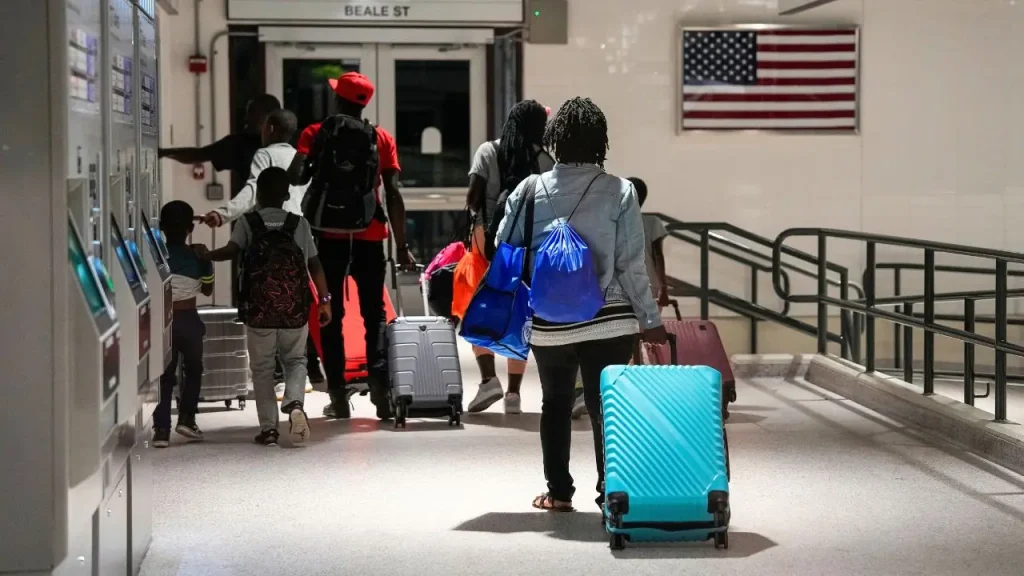U.S. Ends Temporary Protected Status for Haitian Migrants, Sparking Concerns About Safety
The Department of Homeland Security announced Wednesday that it will terminate Temporary Protected Status (TPS) for approximately 353,000 Haitian migrants currently living in the United States. In a federal register notice, the department stated that their protected status will expire in February. Under the leadership of Secretary Kristi Noem, DHS determined that “Haiti no longer meets the statutory requirements for TPS” following consultations with interagency partners. The decision was based on reviews conducted by U.S. Citizenship and Immigration Services and input from relevant government agencies, along with an analysis suggesting that allowing Haitian nationals to remain temporarily in the United States “is inconsistent with U.S. national interests.” This marks a significant reversal from previous administrations that had repeatedly extended protections for Haitians since TPS was first granted in 2010 following a devastating earthquake.
In its announcement, DHS advised Haitian TPS holders to prepare for departure if they have no other legal basis to remain in the country. The department introduced what it called a “secure and convenient self-deportation process” that includes a complimentary plane ticket, a $1,000 exit bonus, and potential future opportunities for legal immigration to the United States. Migrants are instructed to use the U.S. Customs and Border Protection’s CBP Home mobile application to report their departure. This approach represents a stark contrast to the Biden administration’s policy, which had extended TPS for Haitians earlier in 2024, citing “simultaneous economic, security, political, and health crises” in Haiti that were fueled by gang violence and the absence of a functioning government. That extension was originally set to last until February 3, 2026.
The decision to end TPS comes at a time when Haiti faces unprecedented humanitarian challenges. The Caribbean nation has experienced continuous turmoil for years, with governance effectively collapsing following the 2021 assassination of President Jovenel Moïse. This political vacuum has led to surging gang violence, widespread kidnappings, and a severe breakdown in law enforcement. According to the International Organization for Migration, more than 1.4 million people have been displaced by violence and instability in Haiti this year alone—an unprecedented level of internal displacement. The humanitarian situation is particularly dire for children, with UNICEF estimating that more than 6 million people—over half of Haiti’s population, including 3.3 million children—currently require humanitarian assistance.
Despite these documented challenges, the current administration has determined that conditions in Haiti no longer warrant special protections for its nationals in the United States. This policy shift aligns with broader immigration restrictions implemented under the current administration. The termination of TPS places hundreds of thousands of Haitians in a precarious position, many of whom have built lives, established careers, and raised families in the United States over the past decade or more. These individuals now face the difficult choice of returning to a country plagued by violence and instability or seeking alternative pathways to remain legally in the United States.
Human rights organizations and immigration advocates have expressed concern about the safety implications of sending people back to Haiti given the current conditions. The country continues to struggle with multiple overlapping crises that have severely impacted basic infrastructure, healthcare systems, and food security. Gang violence has made large portions of the country, including the capital Port-au-Prince, effectively ungovernable. Despite these circumstances, some Haitians have attempted to flee to the United States. In February, for example, the Coast Guard intercepted 132 Haitians on a boat south of the Florida Keys. The migrants were processed and subsequently repatriated to Haiti, highlighting the continued desperation of those seeking to escape the deteriorating conditions.
The termination of TPS for Haitians represents a significant policy shift that will affect hundreds of thousands of individuals and families. While the administration has provided some incentives for voluntary departure, the underlying question remains whether Haiti can safely receive such a large number of returnees given its current state of crisis. The decision underscores the tensions between immigration enforcement priorities and humanitarian concerns that have characterized U.S. immigration policy debates for decades. As the February expiration date approaches, affected individuals, advocacy organizations, and policymakers will need to grapple with the complex humanitarian, legal, and practical implications of this policy change for both the Haitian community in the United States and for Haiti itself, a nation still struggling to establish stability and security for its citizens.


